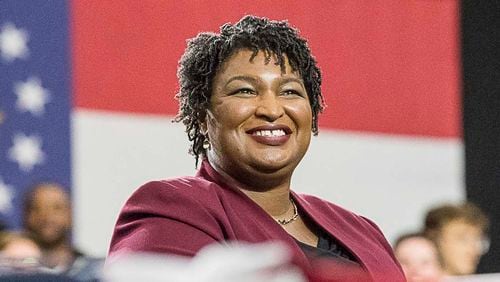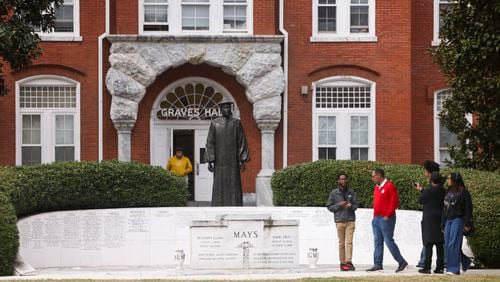Since losing the race for Georgia governor, Stacey Abrams has trekked to England to speak to college students and traveled across Georgia on a "thank-you tour." She's hawked her book at a campus in Nashville, the Gramercy Theatre in New York and a conference of lesbian tech leaders in San Francisco.
She's appeared on a Super Bowl ad with a Republican, journeyed on MARTA trains to promote Gwinnett County's transit referendum, hit the late-night talk show circuit and drawn huge crowds to podcast tapings.
She's delivered the State of the Union Democratic response, dined with presidential contenders and been floated as a running mate to Joe Biden — even as she weighs whether to run for the White House herself.
And she’s managed to raise her national profile higher than ever before, turning her narrow defeat to Brian Kemp into a potential springboard to bigger things. Even she has marveled at the heights of her political celebrity, quipping this week to Vanderbilt University students: “I’m a really good loser.”
As the Democratic race for president begins to solidify, Abrams is pondering a growing array of options: a challenge next year to U.S. Sen. David Perdue, a rematch against Kemp in 2022 or a bid for president, which she said is "definitely on the table."
As her opportunities mount, so too has the pressure. U.S. Senate Minority Leader Chuck Schumer has aggressively recruited her to run against Perdue, a close ally of President Donald Trump’s, and a field of would-be contenders is anxiously awaiting her cue.
And Abrams' recent sit-down with Biden, a private meeting held at his request, stoked speculation the two could share the same ticket next year. Axios reported Thursday that Biden's advisers are torn over whether to launch his campaign with a pledge to run with Abrams — even though she hasn't firmed up her own plans.
Even her closest allies confess they’re in the dark about her next step. Some believe she’s a certain candidate for the Senate. Others say she’s likely to position herself as a vice presidential running mate, freeing her to face Kemp again if that falls through.
Her self-imposed timeline to make up her mind has slipped from late March to mid-April, and in recent interviews and public appearances, she’s talked bluntly about her internal struggle.
“I am going to run for something. And I will tell you in April. But everything is on the table. I’m not being coy,” she said at an Atlanta event. “This is hard. When you spend two years focusing on one thing” — the governor’s race — “it’s not easy to turn to something else.”
‘I don’t concede’
What she’s not doing is sit still.
She has little incentive to rule out any options smack in the middle of a nationwide tour to promote her book, which Abrams said struggled to sell last year during her race for governor.
And she's lined up speaking gigs through the Harry Walker Agency, helped by the will-she-or-won't-she element of intrigue. Her schedule is filling up through the spring with events in Houston, New York and Washington.
For every trip she takes, Republicans see a new line of attack. The National Republican Senatorial Committee has blasted web videos with maps of a plane stopping at each of her destinations that questions: “Where in the world is Stacey Abrams?”
And a Republican-affiliated group filed a complaint with the Internal Revenue Service charging that the Fair Fight Action voting rights group Abrams started is improperly promoting her next ambition. Abrams' aides dispute the claims and call it a GOP smear job.
At each of her stops, she hits a common theme: an open-ended discussion about her next step, punctuated by a promise to run for something. There’s a nudge to buy her memoir and a nod to the ideals of her campaign, including support for gun control measures, abortion rights and new criminal justice policies.
“If you’re anti-abortion, pro-death penalty, I’m not going to convince you with three 30-second ads and a mailer,” Abrams said of her unconventional approach. “I talked about abortion, immigration and gun safety. Those are not the top-of-the-line things the consultants want you to talk about.”
And invariably, in perhaps her most controversial stance, she repeats her refusal to concede the race for governor and halt accusations that Kemp abused his role as the state’s top elections official to suppress and intimidate voters. It’s a charge he vehemently denies.
“I don’t concede that I lost,” she said flatly at her Nashville appearance. “I acknowledge that I’m not the governor of Georgia. That’s made plain every day I don’t walk into the Governor’s Mansion.”
Each time she invokes those claims, Republicans vent their frustration over perceived hypocrisy.
“When President Trump just talked about the possibility of rigged elections, the media pounced,” said Josh McKoon, a former Republican state senator. “Stacey Abrams refuses to acknowledge the result of a free and fair election that she lost by (55,000) votes? Just another Tuesday.”
‘Cathartic’
Her rising star has also made her a must-see attraction for any presidential candidate visiting Georgia. She's met with a half-dozen contenders so far, including U.S. Sen. Amy Klobuchar, whose campaign arranged a sit-down with Abrams after some of her supporters grumbled.
She's dined with U.S. Sen. Elizabeth Warren at the Sundial in Atlanta, lunched with U.S. Sen. Kamala Harris in Washington and grabbed dinner with former Colorado Gov. John Hickenlooper before his CNN town hall. But no meeting has attracted so much attention as her March 14 confab with Biden.
The speculation that their two paths could intertwine on a presidential ticket was unavoidable.
The 76-year-old Biden is a veteran Washington lawmaker who is comfortable in the party's establishment. Abrams, 45, is an unapologetic liberal with a fervent following but little national experience. And Biden, who is edging toward a decision to run for president, seems likely to select a running mate who brings gender, geographic and racial balance to the ticket.
Shortly after they met, reports began to surface that Biden could announce a running mate early and, then, that he was considering opening his campaign with a pledge to tap Abrams as his No. 2. Abrams' aides say Biden made no formal request during their meeting, and they stress that she has yet to firm up her own plans.
Abrams has said little about the sit-down, but she has talked about the two conditions she has for each presidential contender.
“One, you have to tell me what you’re going to do about voter suppression,” she said. “And two, you have to believe Georgia is a swing state.”
Those words were met with a burst of applause in Nashville, where Jacky Akbari was among a sold-out crowd listening to Abrams for the first time. She said she came away convinced Abrams should run for higher office.
“Her message, her story and her relevance right now is so deep,” said Akbari, a nonprofit executive. “It was compelling to hear her share her successes and failures with equal enthusiasm.”
Abrams seems torn herself at what she'll do next. But it's hard to believe she doesn't have a plan. After all, the spreadsheet she made at the age of 18 mapping out her trajectory to the White House is by now the stuff of campaign lore.
In Nashville, she boasted about the way she “upended the tradition of politics” by refusing to shrink from the spotlight after her defeat. And she traced the 10 purgatorial days between the election and the decision to end her campaign, recalling how she flitted between despondency and a determination to run again.
“Revenge,” she said, “can be very cathartic.”
Stay on top of what’s happening in Georgia government and politics at ajc.com/news/georgia-government/.
About the Author








